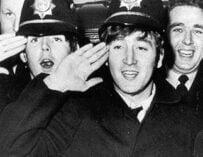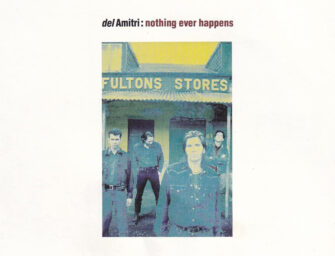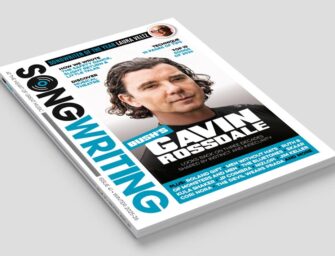
John Lennon in 1969. Photo: Creative Commons/Joost Evers
To celebrate the 80th birthday of an undeniable songwriting genius, we take our pick of a dozen of his finest…
John Lennon was born in Liverpool on 9 October 1940. Just over 40 years later, on 8 December 1980, he was brutally murdered outside The Dakota, his New York home. In between, as a Beatle, member of The Plastic Ono Band, solo artist and with his wife Yoko Ono, he was responsible for arguably the greatest body of musical work in British history.
On what would have been his 80th birthday, we choose 12 of the finest tracks from his post-Beatles catalogue.
Listen to the 12-track John Lennon playlist here
INSTANT KARMA!
The first solo single by a Beatle to sell a million copies, Instant Karma still gets you and knocks you right in the head – starting with those opening piano chords and that drum fill. Reinvigorated by his divorce from his Fab brothers, the rousing chorus packs a punch as heavy as any he threw with his former band. Any fears that the whole might have been greater than the sum of its parts were allayed, for now.
MOTHER
A result of the primal therapy treatment he had undergone with Arthur Janov, Mother finds Lennon embracing his childhood traumas of losing both parents. Abandoned by his father and with his mother hit by a car and cruelly taken from him at a time when their once-estranged relationship was vastly improving, there is no hiding the source material here. In parts it’s a tough listen, in particular the closing cries of “Mama don’t go, daddy come home”. Coming from one of the most famous people on the planet at the time, it’s that rawness which makes it so compelling.
GOD
Over an increasingly urgent repeated piano sequence Lennon effectively puts the 60s to bed. Honest and confessional, like so much of his best work, he makes his way through a list of all the things he no longer believes in (including Elvis and Zimmerman). Most devastatingly of all, he doesn’t even believe in Beatles any more. All that’s left is him and Yoko. If that doesn’t spell it out for you, the song’s final line will… “The dream is over”.
IMAGINE
It would be churlish of us not to include the most famous and best-selling song in Lennon’s solo canon. An example of the power of simplicity, both its piano chords and lyrics, Imagine is not embarrassed about wearing its peaceful heart on its peaceful sleeves. With the theme and lyrical inspiration taken from Ono’s book Grapefruit, it is more of a collaboration between the two than many give it credit for. As contrasts go, this ode to peace is a sharp turn after the anger and hurt of the John Lennon/Plastic Ono Band record.

John Lennon in an advertisement for Imagine from Billboard in 1971. Photo: Creative Commons/Peter Fordham
HOW DO YOU SLEEP?
Snipes in the press and ongoing legal battles gave more than a hint of the state of the Lennon/McCartney relationship in 1971. Those hints became a Molotov cocktail of rage on How Do You Sleep? Angered by perceived insults on McCartney’s Ram album, Lennon fires back with both barrels, channelling his lyrical prowess into a fierce diss track – “The only thing you done was yesterday / And since you’ve gone you’re just another day”. The song’s bluesy underbelly is the perfect place for Lennon to air his dirty laundry; George Harrison joins in too with some particularly spicy slide guitar.
NEW YORK CITY
Taken from the overtly political Some Time In New York City, this track is a definite highlight on what is Lennon’s patchiest record. An homage to the city and the people who live there, The Ballad Of John & Lennon had already shown how he could turn a diary entry into a captivating piece of rock ‘n’ roll and that continues here. Detailing his life as an artist and activist in The Big Apple, as well as hinting at his issues with US immigration, there’s a palpable sense of a man reinvigorated by his new home, what a “bad ass city” indeed.
MIND GAMES
Though the Mind Games album was self-produced by Lennon, the lingering influence of Phil Spector can still be clearly heard on the sweeping orchestration and lush nature of the title track. A reminder of Lennon’s dedication to making love not war, it arrived just as he was splitting from Ono and beginning the 18-month chapter of his life known as the “lost weekend”. Personal affairs aside, Mind Games is a welcome return to form and sits comfortably alongside the best work in Lennon’s solo catalogue.
WHATEVER GETS YOU THRU THE NIGHT
Blasting off with 15 seconds of fierce trumpet from Bobby Keys, Whatever Gets You Thru The Night is a rollicking good time which distils the “lost weekend” into one funky number. Though Elton John provides backing vocals, piano and organ, it’s the frequent interruptions by Keys that provide the song’s propulsive momentum. Impossible to listen to without smiling, that infectious spirit swept WGYTTN to the top of the charts in the US.

Yoko Ono and John Lennon at John Sinclair Freedom Rally at Crisler Arena in Ann Arbor, Michigan in 1971. Photo: Creative Commons
STEEL AND GLASS
A song which starts in the folk scene of Greenwich Village before reaching its rhythmic crescendo with a lick borrowed from his own How Do You Sleep?, Steel And Glass is Lennon at his most vitriolic. Whether aimed at former business manager Allen Klein or himself (or both) is open to interpretation, what’s unmistakable is the anger of the words in this tale of someone who leaves their smell “like an alley cat”. Coming just two tracks after #9 Dream on Walls And Bridges, this is very much the yin to the former’s drifting and tranquil yang.
BEAUTIFUL BOY (DARLING BOY)
Emerging in 1980 from a five-year hiatus with Double Fantasy (a 50/50 collaboration with Ono), Beautiful Boy (Darling Boy) leaves the listener in no doubt that Lennon’s time helping to raise son Sean has had a profound impact on his writing. With a relaxed vibe conjuring up images of both Japan and peaceful sleep, it’s a perfect homage to his second child. Considering the tragic events which took place less than a month after Double Fantasy’s release, robbing Sean of his father, it can also be hard to get through.
WATCHING THE WHEELS
Double Fantasy features some great Lennon compositions (Woman, (Just Like) Starting Over and I’m Losing You to name three others) but its standout track has to be Watching The Wheels. Kicking off with a pimped-up version of his Imagine piano and driven along by Tony Levin and Andy Newmark’s respective bass and drums, it turns his years out of the limelight into something profoundly poetic, forcing the listener to understand that his time off of the merry-go-round was something that he had to do.
I’M STEPPING OUT
Considering all the music that he did give us, it’s perhaps greedy to ask “what if” and wonder what Lennon had left in the tank. Would he have once again donned his Teddy Boy threads for another album of rock ‘n’ roll or joined Yoko for her adventures in new wave, 40 years after his death it’s still heartbreaking that we will never know. Judging by I’m Stepping Out, taken from posthumous encore Milk And Honey, he would have thrown himself into whatever he did next with the same contradictory humour, charisma and genius that characterised his entire time on this planet.
Words: Duncan Haskell

































Related Articles